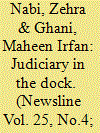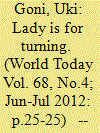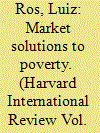| Srl | Item |
| 1 |
ID:
118629


|
|
|
| 2 |
ID:
123252


|
|
|
|
|
| Publication |
2012.
|
| Summary/Abstract |
after nine years of stability, Argentina's president is off on an economic roller-coaster ride, writes Uki Goni
|
|
|
|
|
|
|
|
|
|
|
|
|
|
|
|
| 3 |
ID:
119908


|
|
|
|
|
| Publication |
2012.
|
| Summary/Abstract |
A generation ago, Latin America and the Caribbean (LAC) was known for debt crises, military dictatorships, hyperinflation, and grinding poverty. Today, the region is characterized by regional political and economic integration, increased global market share for its exports, sound financial management, and declining unemployment. Most importantly, it is a region that has internalized its role in the world. Imbued with new choices and an independent voice, the region is emerging as the center of the South-South-East exchange of goods and financial capital between LAC, Africa, and China. It is time for the world to look at Latin America and the Caribbean in a new way.
|
|
|
|
|
|
|
|
|
|
|
|
|
|
|
|
| 4 |
ID:
153958


|
|
|
|
|
| Summary/Abstract |
Prior studies find that military dictatorships display a high propensity to initiate militarized interstate disputes (MIDs). Yet, there is little agreement on which feature of military regimes can best explain this behavior. This article distinguishes between three potential causes: coup risk, the dictator's affiliation with the military, and the military's influence on politics. Using recent data on authoritarian regimes, I find that, whereas coup risk is a strong predictor of conflict initiation, the dictator's affiliation does not affect his foreign policy. Furthermore, I find tentative evidence that the military's influence on domestic politics has a negative effect on MID initiation. These findings thus challenge the view that military regimes' foreign policy is due to the military's organizational culture: the relationship between military regimes and dispute initiation seems to be due to factors that simply happen to add up in military autocracies but are essentially unrelated to regime type.
|
|
|
|
|
|
|
|
|
|
|
|
|
|
|
|